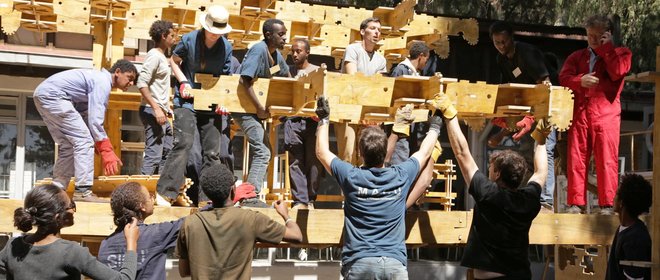Teaching
The ECL-AA as framework for international cooperation in higher education
Relevance, aims, and guiding principles
The ECL-AA thrives to enable and foster innovative teaching and learning formats in all disciplines concerning the built environment in an international environment. Innovative teaching formats incorporate new and improved didactic techniques and technologies and thus contribute to better learning results and experiences. Accordingly, the Lab adopted three basic learning/teaching principles that are further explored in this exhibition: research-based learning, online teaching, and international cooperation.
Research-based learning is a didactic approach that stimulates curiosity and self-motivation by transferring research tasks to students. This can be hands-on construction experiments such as the Sandbag Dome or the programming of modules for an urban design algorithm. In doing so, students learn to question preconceived assumptions, are challenged to cross disciplinary boundaries, and have a more sustainable learning experience. Students also experience knowledge production as a means to grow personally and professionally. In that process, a ‘failed’ experiment, such as the Sandbag Dome, becomes a once-in-a-lifetime learning experience.
Then, the Lab has been experimenting with different methods and technologies in the digital learning arena. For its team and students, the internet has become more than a communication platform. It has become a shared learning space which the team aims to explore and diversify in the future. Moreover, online lectures and digital technologies such as 360°-glasses or computer-aided design software serve as research and learning instruments.
Last, the ECL-AA creates an environment for students from Addis Ababa and Weimar to cooperate and learn from one another, to cross cultural boundaries and challenge each other’s’ prejudices.

